Career
An Ode to Self-Discipline
Many people devalue words like "duty," "soberness," and "discipline." Should we?
Posted May 27, 2014

We dismiss such words as discipline, soberness, obligation, and duty, as unnecessarily puritanical, anachronisms that are out of touch with newer values: find your passion, do what feels good, life's short--eat dessert first!
And the "progress" accelerates:
State-sanctioned lotteries and casinos have burgeoned despite their predominantly hurting the poor, who can least afford to lose. The ultimate in regressive taxation.
Two-thirds(!) of workers now take sick days when not sick.Twelve percent said they took sick days just to watch March Madness! That's so societally accepted that corporations aren't embarrassed to push their recreational product by telling people to take a sick day. For example, the ad below, "A Sick Day is a Terrible Thing to Waste" was sponsored by a consortium of Tahoe hotels and casinos, the one below it by the Weather Network.
The cheat-if-you-can ethos is yet one more reason employers hire as few people and automate as many positions as possible.

Worst of all has been the increased use of mind- and body-damaging drugs. And now, a majority of Americans favor legalizing pot while almost no one (I'm an exception) advocates banning tobacco or even alcohol. They have long devastated humankind but adding wide use of pot, coke, heroin, meth, and party drugs I can't even name, would cause enormous additional damage to health (disease and traffic accidents,) to families, to workplaces. I have written an article providing a mountain of evidence that legalizing "mere" pot is a nightmare for America.
We now have a half-century of experience with Stones/Dylan/Beatles/Grateful Dead-inspired libertinism, the permissive society. Are we so sure that hedonistic ethos has been a net good? For example, while of course, some young people have an excellent work ethic, millions of others will accept only a fine or slacker job, or make minimal effort to find any job, and instead hang out on their parents' sofa and play video games or watch soap operas, perhaps getting high. Many of their parents and especially their grandparents don't begin to understand such a lack of work ethic.
It would seem the world would be better if we all accepted that hard, honest work is not an option but a societal, even cosmic, duty--even if the job is far from ideal. True, there are no longer enough good jobs to go around but there are enough acceptable jobs for all but the weakest employees. And yes, a job as dishwasher, factory worker, sewage-treatment plant worker, or hotel cleaner is--with a reasonable employer--an acceptable job. It seems cosmically wrong for able-bodied people to reject low-level work in favor of letting a family member or the taxpayer pay them for not working.
Lest you wonder if I practice what I preach, no I never worked in a sewage-treatment plant but I was a bookkeeping clerk with a shared desk in Harlem, for two years worked the night shift as a New York City cab driver and, to this day, at almost 64 years old, work 60+ hours a week, 1/4 of which doing pro bono work. This is approximately my 2,500th published article. I finished it after midnight.
As magnificent as is Beethoven's Ode to Joy, I believe that at this stage in society's evolution, we might do better to listen to an Ode to Discipline.
Marty Nemko was named “The Bay Area’s Best Career Coach” by the San Francisco Bay Guardian and he enjoys a 96 percent client-satisfaction rate. In addition to his articles here on PsychologyToday.com, many more of Marty Nemko's writings are archived on www.martynemko.com. Of Nemko's seven books, the most relevant to readers of this blog is How to Do Life: What They Didn’t Teach You in School. His bio is on Wikipedia.


